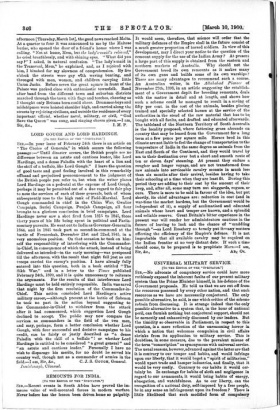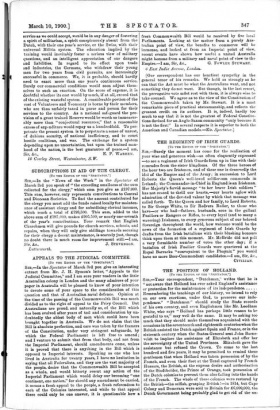UNIVERSAL MILITARY SERVICE.
[To THE EDITOR OF THE "SPECTATOR."]
Si,—No advocate of compulsory service could have more ruthlessly exposed the inherent faults of our present military system than the Prime Minister himself, in his defence of the Government proposals. He told us that we are cut off from the resources possessed by every other nation, and. that such resources as we have are necessarily conjectural. The only possible alternative, he said, is one which critics of the scheme refrain from discussing. It is strange indeed that the only possible alternative to a system that, in the hoar of national peril, can furnish nothing but conjectural support, should not be earnestly and exhaustively discussed by our leaders. But the timidity so observable in Parliament, in respect to this question, is a mere reflection of the unreasoning horror in which a nation that welcomes compulsion in civil affairs shrinks from its application to military service. This is doubtless, in some measure, due to the prevalent misuse of the term "conscription" as synonymous with universal service. The usual reasons, however, advanced against the latter are that it is contrary to our temper and habits, and would infringe upon our liberty, that it would beget a "spirit of militarism," would upset trade and hamper industries, and finally, that it would be very costly. Contrary to our habits it would cer- tainly be. In exchange for habits of sloth and negligence in regard to our armaments, it would bring habits of energy, abnegation, and watchfulness. As to our liberty, can the recognition of a national duty, self-imposed by a free people, be in any sense an infringement upon its freedom ? There is little likelihood that such modified form of compulsory service as we could accept, would be in any danger of fostering a spirit of militarism, a spirit conspicuously absent from the Dutch, with their one year's service, or the Swiss, with their universal Militia system. The education implied by the training would inevitably foster a serious view of military questions, and an intelligent appreciation of our dangers and liabilities. In regard to its effect upon trade and industries, the Germans, who withdraw their young men for two years from civil pursuits, are increasingly successful in commerce. We, it is probable, should hardly need to exact more than one year's continuous service. Surely our commercial conditions would soon adjust them- selves to such an exaction. On the score of expense, it is doubtful whether its cost would by much, if at all, exceed that of the existing wasteful system. A considerable portion of the cost of Volunteers and Yeomanry is borne by their members, who are thus unfairly taxed in purse and person for their services to the country. As a national safeguard the pro- vision of a great trained Reserve would be worth so immeasur- ably more than "conjectural resources," that a reasonable excess of expenditure would repay us a hundredfold. To per- petuate the present system is to perpetuate a sense of unrest, of dubious security, of national inefficiency, and to court hostile coalitions, and war. The exchange for a system depending upon no uncertainties, but upon the trained man- hood of the nation, is the best guarantee of peace.—I am, Sir, 8ze., E. P. WARREN.
18 Cowley Street, Westminster, S. W.







































 Previous page
Previous page